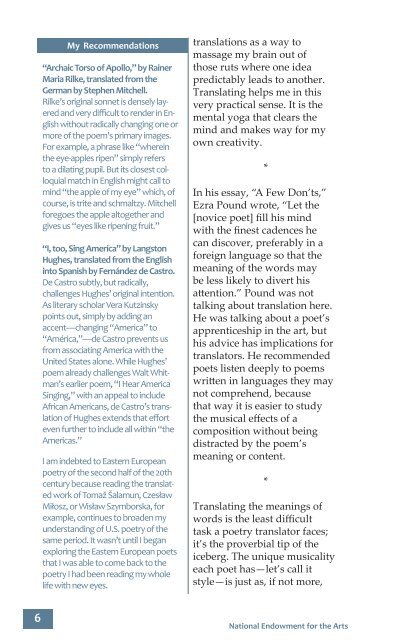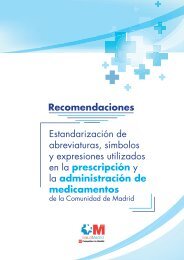lKd7nD
lKd7nD
lKd7nD
You also want an ePaper? Increase the reach of your titles
YUMPU automatically turns print PDFs into web optimized ePapers that Google loves.
My Recommendations<br />
“Archaic Torso of Apollo,” by Rainer<br />
Maria Rilke, translated from the<br />
German by Stephen Mitchell.<br />
Rilke’s original sonnet is densely layered<br />
and very difficult to render in English<br />
without radically changing one or<br />
more of the poem’s primary images.<br />
For example, a phrase like “wherein<br />
the eye-apples ripen” simply refers<br />
to a dilating pupil. But its closest colloquial<br />
match in English might call to<br />
mind “the apple of my eye” which, of<br />
course, is trite and schmaltzy. Mitchell<br />
foregoes the apple altogether and<br />
gives us “eyes like ripening fruit.”<br />
“I, too, Sing America” by Langston<br />
Hughes, translated from the English<br />
into Spanish by Fernández de Castro.<br />
De Castro subtly, but radically,<br />
challenges Hughes’ original intention.<br />
As literary scholar Vera Kutzinsky<br />
points out, simply by adding an<br />
accent—changing “America” to<br />
“América,”—de Castro prevents us<br />
from associating America with the<br />
United States alone. While Hughes’<br />
poem already challenges Walt Whitman’s<br />
earlier poem, “I Hear America<br />
Singing,” with an appeal to include<br />
African Americans, de Castro’s translation<br />
of Hughes extends that effort<br />
even further to include all within “the<br />
Americas.”<br />
I am indebted to Eastern European<br />
poetry of the second half of the 20th<br />
century because reading the translated<br />
work of Tomaž Šalamun, Czesław<br />
Miłosz, or Wisław Szymborska, for<br />
example, continues to broaden my<br />
understanding of U.S. poetry of the<br />
same period. It wasn’t until I began<br />
exploring the Eastern European poets<br />
that I was able to come back to the<br />
poetry I had been reading my whole<br />
life with new eyes.<br />
translations as a way to<br />
massage my brain out of<br />
those ruts where one idea<br />
predictably leads to another.<br />
Translating helps me in this<br />
very practical sense. It is the<br />
mental yoga that clears the<br />
mind and makes way for my<br />
own creativity.<br />
In his essay, “A Few Don’ts,”<br />
Ezra Pound wrote, “Let the<br />
[novice poet] fill his mind<br />
with the finest cadences he<br />
can discover, preferably in a<br />
foreign language so that the<br />
meaning of the words may<br />
be less likely to divert his<br />
attention.” Pound was not<br />
talking about translation here.<br />
He was talking about a poet’s<br />
apprenticeship in the art, but<br />
his advice has implications for<br />
translators. He recommended<br />
poets listen deeply to poems<br />
written in languages they may<br />
not comprehend, because<br />
that way it is easier to study<br />
the musical effects of a<br />
composition without being<br />
distracted by the poem’s<br />
meaning or content.<br />
*<br />
*<br />
Translating the meanings of<br />
words is the least difficult<br />
task a poetry translator faces;<br />
it’s the proverbial tip of the<br />
iceberg. The unique musicality<br />
each poet has—let’s call it<br />
style—is just as, if not more,<br />
6<br />
National Endowment for the Arts



